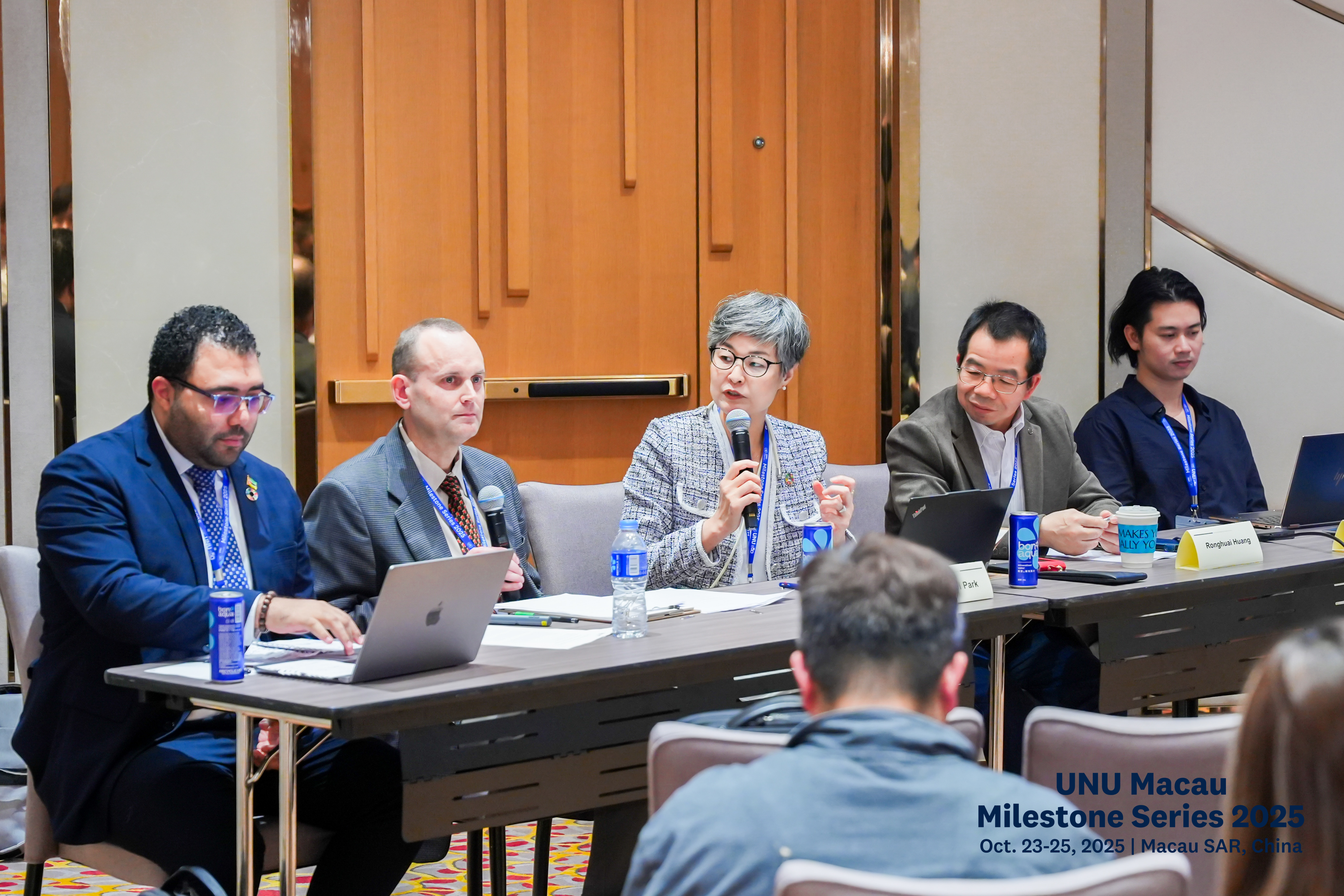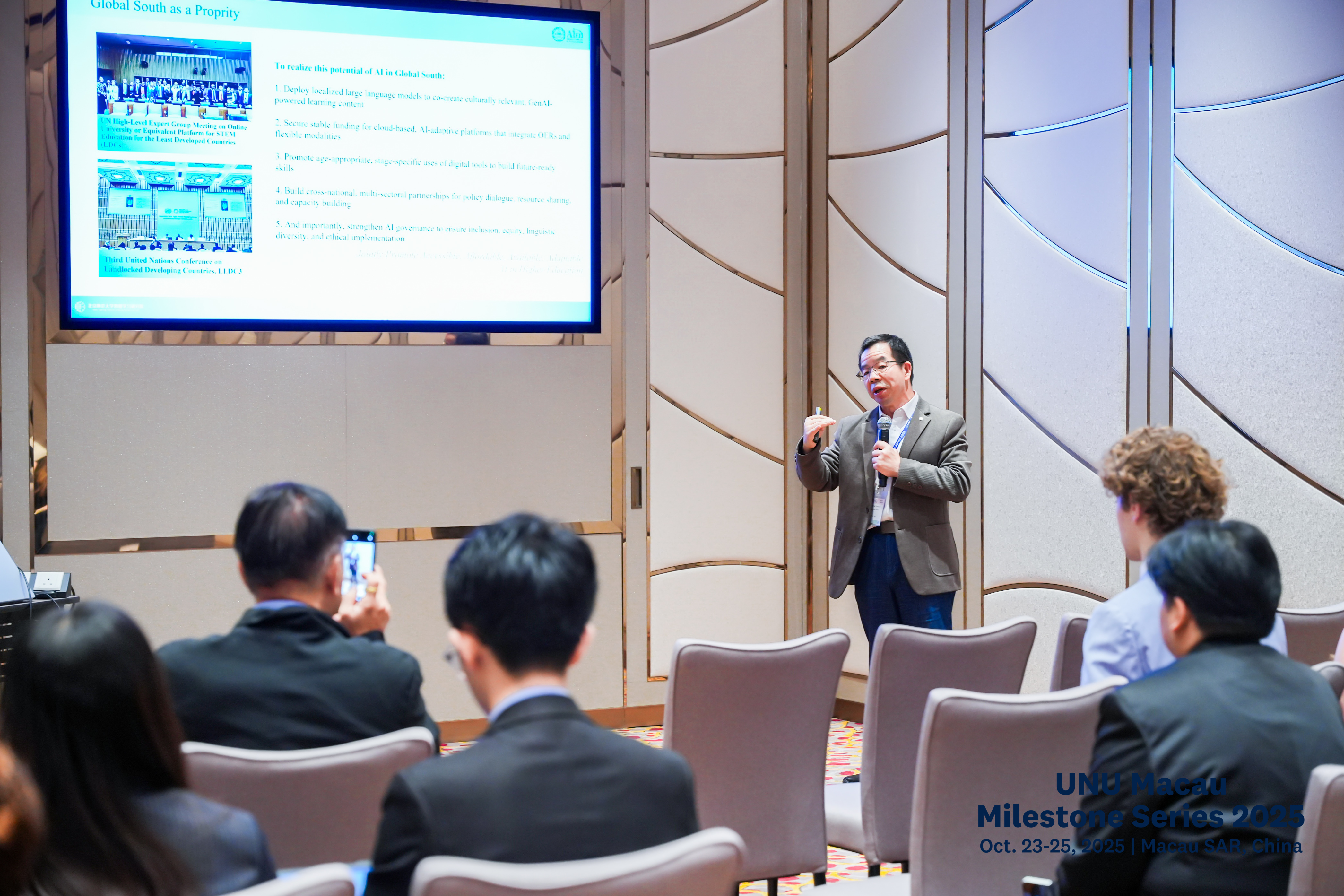Prof. Huang Ronghuai Invited to Attend the United Nations University AI Conference
To mark the 80th anniversary of the United Nations and the 50th anniversary of the United Nations University (UNU), the UNU Macau hosted the "UNU Macau AI Conference" on October 24 at the Galaxy International Convention Center in Macau. Under the theme "AI for Humanity: Building an Equitable Digital Future," the conference brought together over 500 experts, scholars, government officials, representatives from international organizations, private sector, and students from more than 30 countries to exchange views on harnessing AI for human well-being. The event aimed to advance concrete actions toward the UN Pact for the Future and the Global Digital Compact, fostering a human-centered and inclusive digital future.
Prof. Tshilidzi Marwala, the Rector UNU and UN Under-Secretary-General, and Mr. Vincent U, Chairman of the Science and Technology Development Fund of the Macao SAR, attended the conference and delivered opening remarks.

Parallel Session on AI-Driven Transformation Opportunities in Higher Education
During the conference, the UNU Institute for the Advanced Study of Sustainability (UNU-IAS) and the UNESCO International Institute for Higher Education (UNESCO IESALC) co-organized a parallel session on AI-Driven Transformation Opportunities in Higher Education. Prof. Huang Ronghuai, Co-Dean of the Smart Learning Institute of Beijing Normal University and UNESCO Chair on Artificial Intelligence in Education, was invited to speak at the session and shared insights on AI-driven transformation in higher education.

Prof. Huang Ronghuai shared insights on AI-driven transformation in higher education
In his presentation, Prof. Huang highlighted that artificial intelligence is creating new opportunities for higher education in areas such as research and development about or with AI, learning and teaching with AI co-pilots, AI-empowered assessment, and AI-enabled access and services on campus. At the same time, he pointed out that these opportunities are accompanied by significant challenges. He noted, however, that the integration of AI also brings a series of new challenges. These include a pedagogical gap, as traditional teaching and learning models struggle to adapt to the needs of open, flexible, and employment-oriented education in the AI era; a system and data gap, as fragmented coordination and insufficient data integration across teaching, research, and management systems hinder digital transformation; and an ethical and governance gap, as the fast-evolving intelligent technologies heighten concerns about ethics, privacy, and data security. He also pointed to a competency gap, with many educators, students, and administrators still needing to enhance their digital and AI literacy to effectively apply emerging tools; and a regional gap, as ongoing digital divides among regions and institutions continue to restrict equitable access to AI infrastructure and quality educational resources.
Prof. Huang emphasized that addressing these challenges requires redefining the human–AI relationship in education. He encouraged educators and learners to move beyond the “AI toolkit mindset” toward building a new relationship of human–AI synergy in education. For Teachers, he introduced the GROW model to achieve the transformation. The model highlights four interconnected pathways: Grasp AI Principles, by building a solid understanding of AI fundamentals, applications, and ethical dimensions to guide responsible and informed use; Reimagine Teaching and Learning with AI, by integrating generative AI to support curriculum design, resource development, and reflective professional growth; Optimize Teaching and Innovation, by utilizing intelligent technologies to create more interactive, adaptive, and personalized learning experiences; and Weave and Share within Communities, by engaging in professional learning and research communities to exchange innovative practices, co-develop new models, and foster collaboration—particularly important for teachers in remote and underserved areas. For students, Prof. Huang highlighted the importance of cultivating adaptability, autonomy, critical thinking, creativity, and socio-emotional skills to learn effectively in intelligent environments and to thrive in the AI-driven future.
In conclusion, Prof. Huang called on global stakeholders to focus on three key dimensions, including Digital Mindset, Digital Leadership, and Digital Partnership, to strengthen cross-national and cross-sector collaboration mechanisms, enhance the participation of Global South countries in AI-related knowledge sharing, capacity building, research cooperation, and policy dialogue, and jointly explore new paradigms for higher education in the AI era.


